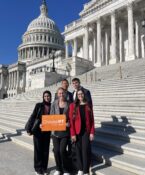Groundbreaking research protects brain from traumatic injury
In groundbreaking research, scientists at the UNTHSC Worth have determined that rapid, estrogen administration can protect the brain following brain injury in animals. These finding are now being tested on human trauma patients in North Texas.
James Simpkins, Ph.D., UNT Health Science Center chair of the Department of Pharmacology and Neuroscience, and Jane Wigginton, M.D., Department of Surgery, Division of Emergency Medicine at UT Southwestern Medical Center of Dallas, are translating their animal studies of the protective effects of rapid estrogen treatment to human patients with severe traumatic brain injury and hemorrhagic shock.
“Our animal research has demonstrated that rapid estrogen intervention protects the brain following an injury like stroke or sudden cardiac arrest,” Simpkins said. “Now, UT Southwestern and Parkland Hospital are advancing our research from the UNT Health Science Center to the studies in human subjects. If we can administer these drugs to trauma victims very early, I believe that we can protect the brain and increase survival.”
Simpkins’ studies in animals found that rapidly administering a single dose of estrogen, a strong anti-oxidant and an anti-inflammatory drug, in stroke increases brain cell survival by up to 65 percent. Estrogens delivered intravenously post injury may have similar effects on people with traumatic brain injury. “We know these substances can protect the brain and we believe are safe for patient use,” Simpkins said.
The clinical trials are based on now hundreds of scientific publications from Simpkins group and others demonstrating the protective effects of estrogens in acute brain injury. Dr. Simpkins leads a large National Institutes of Health-funded program of research to discover substances that can protect the brain from injury. This is the first major clinical study to emanate from these basic science studies at the University of North Texas Health Science Center at Fort Worth.
Estrogens are made in large amounts by young women, but only in small amounts by men. Prior studies have suggested that young women are more resistant to cardiac arrest than are older, post-menopausal women and men. This apparent resistance of young women to brain trauma may be because of their higher estrogen levels. These current studies of the effects of rapid estrogen administration on patients with traumatic brain injury and hemorrhagic shock will be a test of this proposal.
In 1994, Dr. Simpkins discovered that estrogens were protective to nerve cells and subsequently has demonstrated that, if administered soon after brain injury in animals, estrogens can protect nerve cells and reduce neurological deficits. Application of these discoveries to human subjects awaited the interactions of Simpkins with the pioneering clinical research of Dr. Wigginton, who is now the first to take estrogens into clinical trials for acute brain injury and hemorrhagic shock.





Social media